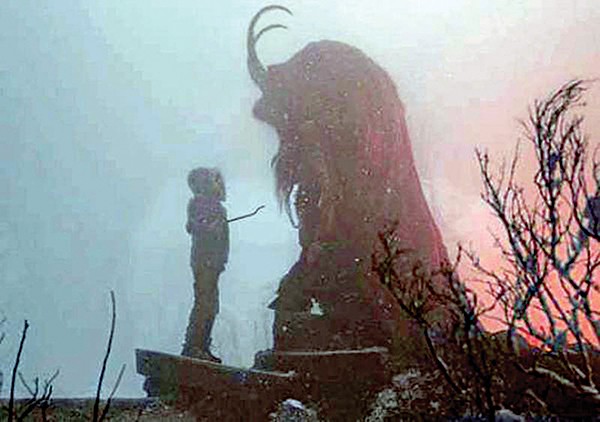The Christmas holiday’s power as an inducer of seasonal affective disorder lies in its rigid family decorum and enforced good feeling. That’s why Christmas movies like Bad Santa, Gremlins, and Die Hard resonate: Their blood and vulgarity ridicule that decorum and the sinking sense of not living up to an impossible ideal.
The horror film Krampus invades the suburbs with blood and shock, but wrapped around that is a disgust with annoyances of the season that isn’t as lived-in. It opens with a slow-motion montage of a Black Friday shopping riot, which segues into our main character’s onstage fight in a Christmas play. The slo-mo isn’t subtle, but it is special. From there, things get less so. Max (Emjay Anthony), a true believer in Santa Claus, has his love for Christmas challenged by the arrival of in-laws and the resulting tension between his mother and father (Toni Collette and Adam Scott). In anger, he rips up a letter to the North Pole and tosses it into the wind, where the mythological German monster Krampus finds it, thus precipitating his family’s ruin.
Krampus, a reverse Santa Claus who steals naughty children, is a perfect premise for horror. Director Michael Dougherty makes the mistake of taking his sweet time getting to his horned monstrosity, alternating between Max’s trite wishes for family togetherness and the in-laws’ one-dimensional idiocy in a slow build to the supernatural. The result is the first half plays like a weaker version of National Lampoon’s Christmas Vacation.

Max, played by Emjay Anthony, versus Krampus
Old pros like Scott, Collette, and David Koechner can’t elevate the material. The slow build only leaves those beats for brief, imaginative stops in a German-speaking granny’s animated backstory, and wonderful It Follows-like visuals of Krampus stalking the rooftops. A magical storm descends upon the family, stranding them in their house. The sudden claustrophobia of electricity loss, missing neighbors, and blocked streets is well done. But the film only truly comes alive when the characters visit the attic, and are attacked by a league of wonderfully designed nightmare toys.
This structure won’t matter to the older children the film seems pitched at — the two-dimensional Christmas love-hate will be fresh to them. For their benefit, the film has been denuded of gore that would ordinarily punctuate every monster attack. (Several characters helpfully sink into the snow without blood.) Lovingly terrifying images, from a gingerbread man catching children with a hook and pulling them up a fireplace, to a kid’s slo-mo fall into Hell, will stick in the mind even when the script fails.
I particularly liked the Gremlins-esque gingerbread men’s nailgun attack, a teddy bear with sharp teeth, and a Christmas tree angel with gargoyle wings. The film’s ending also strikes the right horrific note for kids, in the manner of an old Twilight Zone. Dougherty, who has done seasonal horror before with Trick ‘r Treat, is very spirited when it comes to visuals, and when we finally see Krampus up close, he’s a wonderful Guillermo del Toro-like creation. He should have had more to do, in the manner of frequently seen villains like Freddy or Jason. Future Krampus films letting forth the bloodcurdle everyone feels at the group-schmaltz belch of our collective winter holiday should just get right to it.